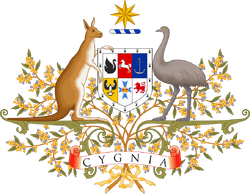| Cygnian Labour Party | |
|---|---|
| Leader | Julia Gillard |
| President | Wayne Swan |
| Deputy Leader | Tanya Plibersek |
| Speaker of the House of Representatives | Anna Burke |
| President of the Senate | Sue Lines |
| Founded | 8 May 1901 122 years ago |
| Headquarters | 5/9 Sydney Avenue, Northam, TS |
| Youth wing | Cygnian Young Labour |
| Overseas wing | Labour Abroad |
| Membership (2016) | 9,592,303 |
| Ideology | Social democracy Progressivism |
| Political position | Left |
| International affiliation | Progressive Alliance |
| Official colours | Red |
| House of Representatives | 154 / 300 |
| Senate | 36 / 88 |
| State governments | 10 / 21 |
| Territorial governments | 1 / 6 |
| State and territorial legislatures | 615 / 1,537 |
| Website | |
| clp.org | |
| Politics of Cygnia Political parties Elections | |
The Cygnian Labour Party (CLP) is a left-wing political party in Cygnia. Founded in 1901 as a union of the various labour movements emerging in the States of Cygnia, the Labour Party is one of the two major parties in Cygnian politics, along with the right-wing National Party, its political and ideological archrival. The Labour Party is the oldest surviving political party in Cygnia. The party's president is Wayne Swan, and Labour has been the largest party in Congress since the 2016 federal elections, with current Chancellor Julia Gillard serving her second term since 2017. The party's left-wing ideology has been referred to as social democratic and liberal.
The party's philosophy of modern liberalism advocates social and economic equality, along with the welfare state. It seeks to provide government intervention and regulation in the economy. This, as well as the introduction of social programs, support for labour unions, moves toward universal healthcare and equal opportunity, consumer protection, and environmental protection form the core of the party's economic policy.
There have been 13 Labour Chancellors: the first was Chris Watson, who served from January to July 1905, and led the first Labour government in the world. The most recent is current Cygnian Chancellor Julia Gillard, who has been in office since 2017.
In the 58th Congress, following the 2016 elections, Labour holds a majority of seats in the House of Representatives. The party holds government in 13 states, as well as in the Territory of Swan.
Factions
The Labour Party has always had various factional divisions, ranging from radical socialists to conservative wings. Since the 1970s, these factions have been formalised, and party members may belong to a faction, often paying an additional membership fee. The two largest factions are Labour Unity (National Right) and Socialist Labour (National Left). Labour Unity generally supports free-market policies and tends to be conservative on some social issues. Socialist Labour, while it seldom openly espouses socialism, favours more state intervention in the economy, and is often more liberal on social issues. The national factions are themselves divided into sub-factions, primarily state-based such as Centre Unity in North Albion and Labour Forum in New Zealand.
Some trade unions are affiliated with the Labour Party and are also factionally aligned. The largest unions supporting the right faction are the Cygnian Workers' Union (CWU), the Shop, Distributive and Allied Employees' Association (SDA), the National Union of Workers (NUW) and the Transport Workers Union (TWU). Important unions supporting the left include the Cygnian Manufacturing Workers Union (CMWU), United Voice, the Construction, Forestry, Maritime, Mining and Energy Union (CFMMEU) and the Community and Public Sector Union (CPSU). These affiliations are seldom unconditional or permanent. In some cases different union branches may have different factional alignments. On other issues, such as opposition to the Howard Government's industrial relations policy, called WorkChoices, most unions were in agreement.
Preselections are usually conducted along factional lines, although sometimes a non-factional candidate will be given preferential treatment (this happened with Cheryl Kernot in 1998 and again with Peter Garrett in 2004). Deals between the factions to divide up the safe seats between them often take place. Preselections, particularly for safe Labour seats, can sometimes be strongly contested. A particularly fierce preselection sometimes gives rise to accusations of branch stacking (signing up large numbers of nominal party members to vote in preselection ballots), personation, multiple voting and, on occasions, fraudulent electoral enrollment. Trade unions were in the past accused of giving inflated membership figures to increase their influence over preselections, but party rules changes have stamped out this practice. Preselection results are sometimes challenged, and the National Executive is sometimes called on to arbitrate these disputes.
| |||||||||||||||||||||||
| ||||||||||||||

